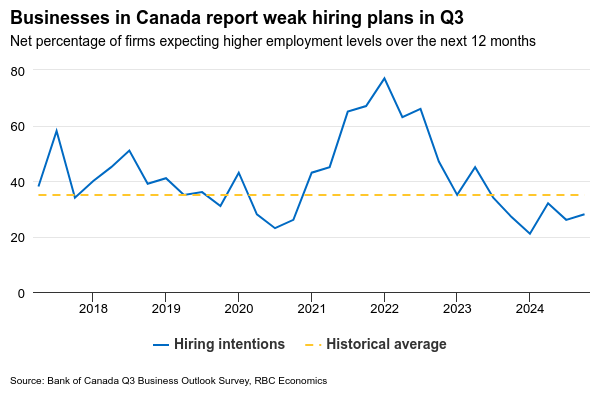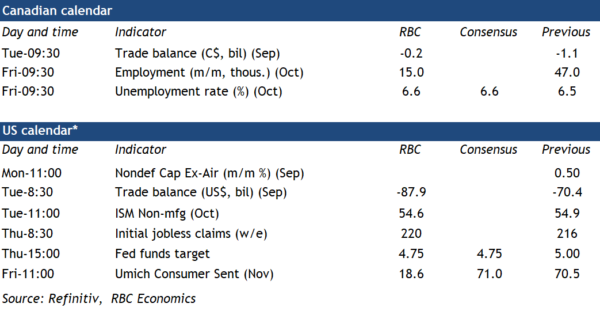We think Friday’s Canadian employment report should tell a familiar story—that the labour market has continued to weaken in October amid slowing hiring demand. Employment is still expected to increase, but not by much. We expect 15,000 jobs were added, but that would again undershoot growth in the labour force and population, and push the unemployment rate back up to 6.6% after a tick lower to 6.5% in September.
Leading indicators for employment conditions in Canada are still sending weak signals. Job openings have already dropped below pre-pandemic levels, and are still plunging. Business hiring intentions, according to the Bank of Canada’s latest Business Outlook Survey, have remained soft in Q3 driven by a subdued sales outlook over the next 12 months. Looking forward, we think unemployment will continue to rise in Canada to 7% by early 2025 before trending lower on a recovery in hiring demand.
The U.S. economic backdrop ahead of the Federal Reserve’s interest rate decision on Wednesday is very different, and much stronger.
Another solid increase in Q3 gross domestic product last Thursday extended a string of resilient U.S. economic data compared to other advanced economies. Still, labour markets have shown signs of cooling. The unemployment rate has inched higher, but very gradually, which is consistent with a normalization from overheated levels rather than faltering. An unusually large government budget deficit—which would likely increase under campaign pledges from both major presidential candidates in the week’s elections—will keep a floor under the economy and inflation in the year ahead.
Interest rates are still likely higher than they need to be for inflation to return fully back to the Fed’s 2% inflation target. We expect the Fed to cut interest rates by another 25 basis points on Wednesday. Beyond that, we expect a 25-bps cut at each of the next two policy decisions in December and January before a pause. That leaves the Fed funds range at 4% to 4.25% for the rest of 2025.
Week ahead data watch
We look for Canadian trade deficit to narrow to $200 million in September, led by lower imports and higher exports. Oil prices were down significantly by 8.3% in September, lowering the energy trade balance. Rail activities were disrupted by the strike in August, but that decline should reverse in September, boosting exports.
The U.S. trade deficit likely widened to US$87.9 billion in September. According to the advance indicators, goods deficits were up US$14 billion from August, mainly due to falling exports (-2%), and higher imports (3.8%) during the month.



